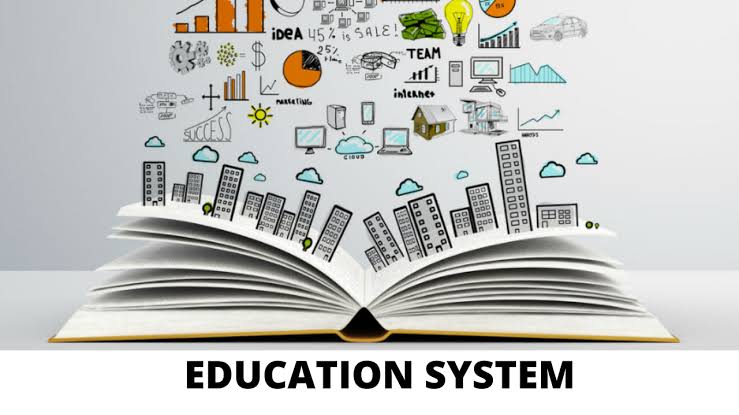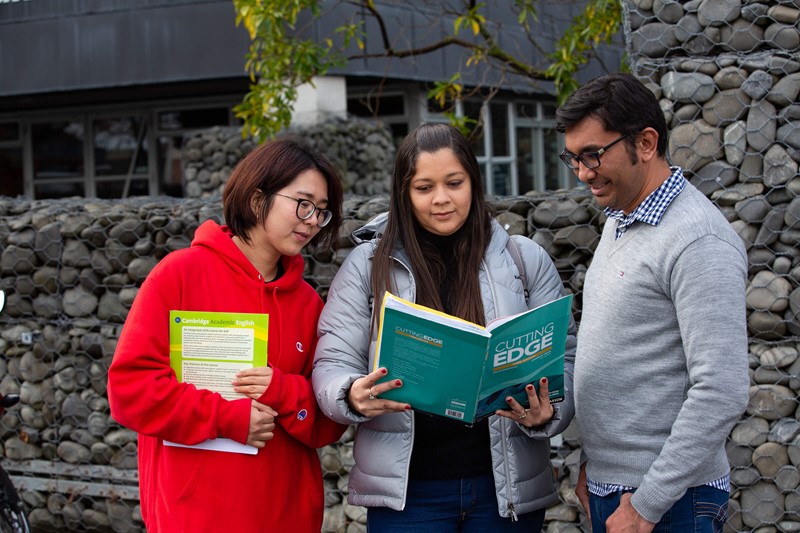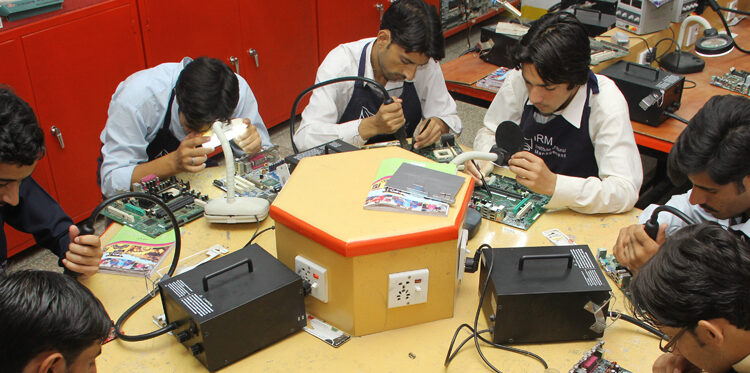“Explore Education in Pakistan with Syeda”

Pakistan faces a significant challenge with its literacy rate, which is lower than many other countries. In 2022, there were large differences in literacy across the country. For example, Islamabad has a high literacy rate of 96%, while the Torghar District has a very low rate of just 23%. Additionally, there are major gender and regional gaps. In tribal areas, only 9.5% of females are literate.

Primary Education in Pakistan

In Pakistan, only about 67.5% of children complete their primary school education. The national education system mainly follows the English educational framework. Pre-school education is for children aged 3 to 5 years and consists of three stages: Play Group, Nursery, and Kindergarten (often called ‘KG’ or ‘Prep’).
After pre-school, students go to junior school from years 1 to 5, followed by middle school from years 6 to 8. In middle school, many communities prefer single-sex education. However, co-education is also common in urban areas. The curriculum can differ by institution, but there are eight commonly examined subjects:
- Arts
- Computer Studies and ICT
- General Science (including Physics, Chemistry, and Biology)
- Modern languages with literature, such as Urdu and English
- Mathematics
- Religious Education (Islamic Studies)
- Social Studies (including Civics, Geography, History, Economics, Sociology, and sometimes elements of law, politics, and PHSE).
Most schools also offer subjects like drama, music, and physical education. However, these subjects are usually not formally examined or graded. Home economics is sometimes taught specifically to female students. General science textbooks often include topics related to astronomy, environmental management, and psychology.
Secondary Education in Pakistan

Secondary education in Pakistan starts in year 9 and lasts for four years. At the end of each school year, students must pass a national examination administered by a regional Board of Intermediate and Secondary Education (BISE).
- After completing year 9, students take a standardized test for the first parts of their academic subjects, known as SSC-I.
- They take similar tests for the second parts of the same courses at the end of year 10, called SSC-II.
- Upon successfully passing these examinations, students receive a Secondary School Certificate (SSC), commonly referred to as a ‘matriculation certificate’ or ‘matric’.
The curriculum typically consists of eight courses, which include both elective and compulsory subjects.
- Elective subjects may include:
- Biology
- Chemistry
- Computer Science
- Physics
- Compulsory subjects include:
- Mathematics
- English
- Urdu
- Islamic Studies
- Pakistan Studies
The total marks for the Matriculation examination are 1100, divided between the 9th and 10th grades.
- 75 marks for Mathematics
- 75 marks for English
- 75 marks for Urdu
- 50 marks for Islamic Studies (or ethics for non-Muslim students)
- 50 marks for Pakistan Studies
- 65 marks for Sciences (Biology, Chemistry, Physics)
- An additional 90 marks are allocated for practical exams (30 for each science subject).
After completing secondary education, students proceed to an intermediate college to complete years 11 and 12.
Tertiary Education in Pakistan

Tertiary education in Pakistan begins after students complete their Higher Secondary School Certificate (HSSC). After this, they can pursue various Bachelor’s degree programs in professional institutes, which include fields such as:
- Engineering (BE/BS/BSc Engineering)
- Computer Sciences (BS/BSc/BSc Engineering)
- Medicine (MBBS)
- Dentistry (BDS)
- Veterinary Medicine (DVM)
- Law (LLB)
- Architecture (BArch)
- Pharmacy (Pharm.D)
- Nursing (BSc Nursing)
The University of Punjab

The University of the Punjab, established in 1882 in Lahore, is recognized as the oldest university in Pakistan. According to UNESCO’s 2009 Global Education Digest, as of 2007, only 6% of Pakistanis (9% of men and 3.5% of women) held university degrees.
The government aimed to increase this figure to 10% by 2015 and further to 15% by 2020. There is also a notable variation in degree attainment among different age groups: less than 6% of individuals aged 55-64 have a degree, compared to 8% in the 45-54 age group, 11% in the 35-44 age group, and 16% in the 25-34 age group.
To ensure that education in professional fields is of high quality, several accreditation councils are responsible for accrediting degrees and registering professionals. These councils include:
- Pakistan Engineering Council (PEC)
- National Computing Education Accreditation Council (NCEAC)
- Pakistan Medical Commission (PMC)
- Pakistan Veterinary Medical Council (PVMC)
- Pakistan Bar Council (PBC)
- Pakistan Council for Architects and Town Planners (PCATP)
- Pharmacy Council of Pakistan (PCP)
- Pakistan Nursing Council (PNC)
Non formal and Informal Education in Pakistan

In addition to the formal education system, Pakistan has a variety of non-formal education initiatives, primarily operated by the public sector. These include numerous vocational schools and training centers that focus on skill development. Among these institutions are vocational schools, technical training centers, and agriculture training centers. The state also supports an apprenticeship system to further enhance vocational training.
Informal education plays a significant role in Pakistan, particularly for school dropouts and individuals with limited skills. This form of education often involves training under the guidance of experienced craftsmen. Additionally, some private companies run training programs aimed at university students, helping them gain practical experience and bridging the gap between academic learning and industry requirements. For instance, Appxone Private Limited offers professional development training for engineers in key areas such as electronics and computer science.
Moreover, informal education has attracted the attention of not-for-profit organizations, which have initiated various projects across the country. A notable example is the Magnifi Science Centre in Karachi, which focuses on providing educational opportunities outside the traditional classroom setting.
Gender Disparity in Education in Pakistan

Pakistan is characterized by a deeply entrenched patriarchal society that significantly influences its educational system, leading to a noticeable gender disparity. According to the 2016 Global Gender Gap Report, Pakistan was ranked as the second worst country globally in terms of gender inequality. The issue of gender discrimination in education is particularly prevalent among the poorest households, with only 18% of Pakistani women having completed ten years or more of schooling. The education system has faced criticism for its unequal enrollment levels between genders.
However, there have been some positive developments in recent years aimed at addressing this issue. For instance, the female-to-male enrollment ratio (F/M ratio) at the primary education level improved from 0.47 in 1990-91 to 0.74 in 1999-2000, marking a 57.44% increase over the decade. Similarly, at the middle education level, the F/M ratio rose from 0.42 to 0.68, reflecting a nearly 62% improvement, with a more rapid decrease in gender disparity at the middle level.
Since 2006, there have been notable advancements in literacy and educational attainment for women in Pakistan. A significant milestone was reached in 2010 when primary education was declared a legal right for children aged five to sixteen. Despite these improvements, challenges remain in achieving complete gender parity in education enrollment.
Teacher Education

Teacher education reform is essential for enhancing the quality of education in Pakistan. Currently, teacher training programs at universities are hindered by a lack of qualified professionals. In Balochistan, for instance, nearly one-third of universities do not have professors in their teacher education departments, and there are no PhD programs in Education available.
Since teachers play a pivotal role in establishing a progressive education system, it is crucial to provide adequate funding and consistency in teacher preparation programs. This reform must include investments in updating curricula and improving teacher education facilities, such as infrastructure, libraries, IT departments, and laboratories.
The education system in Pakistan faces several significant challenges, including access to education, equal opportunities, and the relevance of content. In many regions, government leaders have not implemented strategies to ensure that children can attend school, leading to situations where students live too far from educational institutions. Additionally, female students often do not have the same access to classes as their male counterparts, and female teachers frequently lack suitable teaching spaces. The content taught in schools also raises concerns about its relevance to students’ lives and future opportunities, further complicating the educational landscape in Pakistan.
Addressing these issues is vital for creating a more equitable and effective education system that meets the needs of all students, regardless of gender or location.
Technical and Vocational Education

Education is crucial for the development of countries as it equips future generations with essential life skills. Since the abolition of the eighteenth amendment in 2010, there has been increased autonomy in the healthcare and education sectors. Technical and Vocational Education Training (TVET) has gained significant attention for its role in preparing students for future employment opportunities. TVET programs cover important subjects such as money management, personal and family health practices, electronics, and healthcare information.
However, Pakistani leaders encounter several challenges in managing TVET institutions effectively. These challenges include providing adequate salaries for teachers, hiring competent instructors, maintaining an updated curriculum, and ensuring equitable access to programs. The primary objectives of TVET are to invest in the workforce to boost the economy and promote wealth redistribution.
By addressing these issues, Pakistan can enhance the effectiveness of its TVET programs, ultimately benefiting the economy and society as a whole.
Teacher Satisfaction

Life satisfaction is deeply intertwined with teachers’ experiences in their work environments. A recent study conducted in Pakistan examined the life satisfaction and emotional intelligence of teachers in regular institutions compared to those in special education institutions. The results showed that teachers in special education reported significantly higher levels of emotional intelligence. This indicates that they possess greater self-awareness regarding their challenges and demonstrate a better capacity to find effective solutions to their problems.
These findings highlight the importance of emotional intelligence in the teaching profession, especially in special education settings. It suggests that the unique challenges faced by special education teachers may foster a deeper understanding of their emotional landscape, ultimately contributing to their overall life satisfaction. By recognizing the value of emotional intelligence, educational leaders can better support teachers in all settings, leading to improved job satisfaction and, in turn, enhanced educational outcomes for students.
Teachers’ Issues
In Pakistan, educators encounter numerous challenges that affect their ability to deliver quality education. Some of the prevalent issues include:
Low salaries: Many teachers in Pakistan receive inadequate pay, making it challenging to attract and retain skilled professionals in the field.
Insufficient resources: Teachers often lack access to essential resources like textbooks, classroom supplies, and technology, hindering their ability to teach effectively.
Overcrowded classrooms: With many classrooms being overcrowded, it becomes difficult for teachers to give individual attention to each student, impacting the learning environment.
Gender discrimination: Female educators may experience workplace discrimination and harassment. Along with cultural obstacles that restrict their access to education and professional growth opportunities.
Lack of training: A significant number of teachers have limited access to training and professional development. Which prevents them from learning new teaching methods and keeping up with advancements in education.
Job insecurity: Many teachers face uncertain job security, contributing to high turnover rates and decreasing motivation among staff.
Cultural and societal challenges: Teachers also grapple with various societal and cultural issues that can further complicate their roles and responsibilities in the education system.
Conclusion
Teachers in Pakistan face several significant challenges that hinder their ability to provide quality education. Key issues include low salaries, which make it hard to attract and retain skilled professionals. Inadequate resources such as textbooks and technology. Overcrowded classrooms that limit individual attention for students. Female teachers often deal with gender discrimination and cultural barriers affecting their professional development.
Additionally, many educators lack training opportunities to enhance their teaching strategies, and job insecurity leads to high turnover rates and reduced motivation. Overall, societal and cultural challenges further complicate the teaching environment in Pakistan.
References
- Archived copy” (PDF). Archived from the original (PDF) on 16 August 2011. Retrieved 3 September 2010.
- Jump up to:a b Dr Pervez Tahir. “Education spending in AJK”. The Express Tribune.
- “Education”. www.unicef.org. Retrieved 2 September 2021.
- “Graduates face higher unemployment in Pakistan – here’s why”. mint. 10 April 2023. Retrieved 14 June 2023.
- Saeed, Barkan (4 October 2021). “Strengthening IT skills”. DAWN.COM. Retrieved 5 October 2021.
- Stuteville, Sarah (16 August 2009). “seattletimes.nwsource.com/html/localnews/2009670134_pakistanschool16.html”. The Seattle Times.
- UNESCO Institute for Statistics. “Adjusted net enrolment ratio in primary education”. UNESCO. Retrieved 19 September 2011.

External links
- World Data on Education, IBE (2011) Archived 8 August 2014 at the Wayback Machine – overview of Pakistan’s education system
- TVET in Pakistan, UNESCO-UNEVOC(2013) – overview of the technical and vocational education system in Pakistan
- “Pakistan ruined by language myth” – Zubeida Mustafa
Post Comment